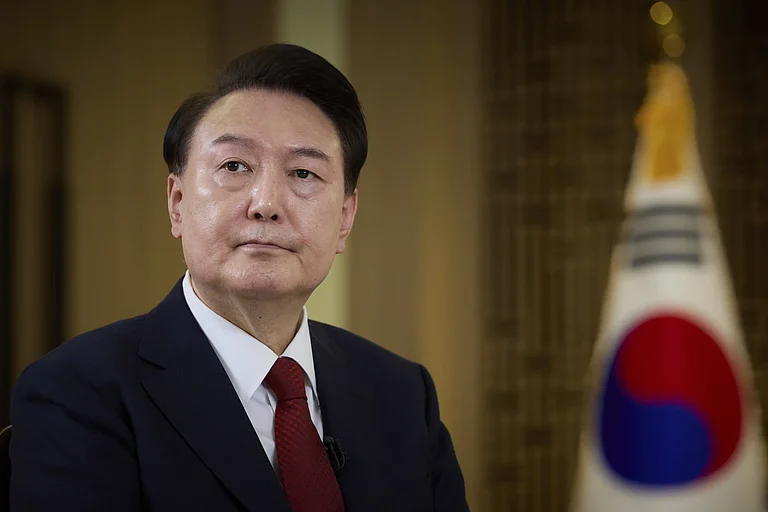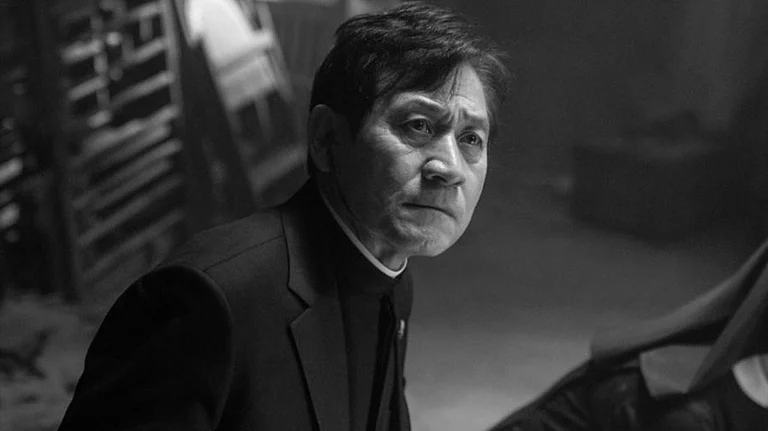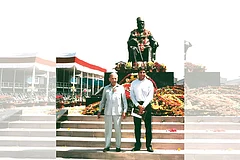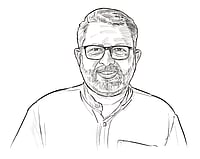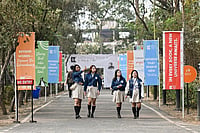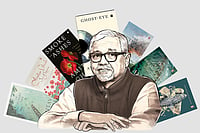This story was published as part of Outlook's 1 November, 2024 magazine issue titled 'Bittersweet Symphony'. To read more stories from the issue, click here
“Some memories never heal. Rather than fading with the passage of time, those memories become the only things that are left behind when all else is abraded. The world darkens, like electric bulbs going out one by one. I am aware that I am not a safe person.”
—Human Acts, Han Kang
Han Kang, the 2024 Nobel Laureate for literature, has made history as the first Asian woman writer and the first South Korean author to be awarded the literature prize. Announcing her win, the Nobel Committee praised her “intense poetic prose that confronts historical traumas and exposes the fragility of human life” and “her empathy for vulnerable, often female lives…” Han didn’t hold a press conference after the announcement. She chose not to celebrate her win at a time when wars are raging between Ukraine-Russia and Israel-Palestine, with deaths being reported every day.
Much of Han’s fiction traces the impact of violence on ordinary lives, the suffering inflicted on those who stood up against authoritarian regimes in South Korea’s history, and the burden of historical traumas. She chronicles vulnerable lives with empathy, and looks tyranny in the eye without flinching. Her novel Human Acts gives a voice to the pro-democracy protestors who were massacred by the South Korean military at Gwangju city in 1980. By immortalising them in prose, she has ensured that their memory will live on and the massacre will not be denied. In We Do Not Part, (slated to be published in English next year), the shadows of the mass slaughter of the residents of South Korea’s Jeju Island darkens the fictional present. Many islanders, accused of being collaborators, were shot dead by the military in the 1940s. Both novels capture the brutality of state-sponsored violence and the inherited trauma of future generations.
The act of surviving and the act of remembering are equally weighted in Kang’s fiction. Those who were slaughtered or buried in mass graves are not abandoned in the wilderness of oblivion. Those who mourn find the space to do so in her narratives. “My novels explore human suffering,” Han had once said in an interview. When she wrote Human Acts, she was “aware that readers should, in turn, be prepared…to experience such suffering themselves.”

A well-known name in her home country, it was Han’s 2007 novel The Vegetarian, translated into English by Deborah Smith, that brought her global recognition. The boundary-defying novel set in contemporary Seoul won the International Booker Prize in 2016, gifting Han a worldwide readership. Her other novels include Greek Lessons, Your Cold Hands, The Wind Blows, Go and The White Book. She has also published several short stories, poems, essays and children’s books.
***
Korean literature, despite its rich history and the presence of many excellent contemporary writers, is far less familiar to readers across the world than Chinese and Japanese literature. Han’s win can change this. With the Nobel shining the spotlight on her and triggering a fresh wave of interest in her work, South Korean writing could get a fillip to occupy a larger space on the global stage. More readers are likely to be introduced to Han’s work in the wake of the Nobel. Many will get to understand Korean literature in a broader sense and learn about pivotal moments in the country’s history.
Contemporary women writers like Han Kang, Bora Chung, Shin Kyung-sook, Kim Sagwa and Cho Nam-joo, among others, have been highlighting the skewed balance of power between men and women in South Korea in their work. They have explored sexism, misogyny, family ties, gendered violence, political uprisings and state control. The Nobel, while marking a milestone in Han’s literary journey, is also a significant celebration of women’s writing in a country where society—and the literary establishment—remain largely male dominated.
Post the Nobel Committee’s announcement, Korean-American novelist Min Jin Lee, author of Pachinko, called Han “a brilliant novelist who reflects our modern condition with courage, imagination and intelligence.” South Korean author Jeon Heyjin told The Guardian, “As soon as I heard about Han Kang’s Nobel Prize win, I thought of her dedication to writing novels that address marginalised groups…I believe she represents the pain and discrimination of modern Korean history through her work while demonstrating the courage for all of us to move toward a better future.”
Han was born at Gwangju in 1970. She moved to Seoul a few months before the Gwangju uprising broke out. Though she was a child at the time, a photograph of the massacre her father showed her affected her deeply. As an adult, she wondered how humans could inflict such unspeakable acts of violence on others. The complexity of human nature—the capacity for unbridled violence and for kindness—fascinated her. How could the two coexist? And how does violence affect the sufferers’ identity and body? Han’s fiction is a relentless search for the answers.
In a 2017 New York Times interview, she declared, “The last line of defense by which human beings can remain human is the complete and true perception of another’s suffering.” Human Acts bears witness to the suffering of the affected without flinching. It captures the horrors of the dictatorship’s coldblooded murder of civilians at Gwangju, but breaks the mould of witness literature by using an unexpected stylistic device: the souls and the bodies of the victims separate, and the characters are able to watch their own annihilation. Though seeped in contemporary history, this narrative has all the philosophical complexity of a Greek tragedy. We Do Not Part imagines the trajectories of the lives of later generations, who are scarred by the memories of violence and making an effort to heal. Powerful imagery and incandescent prose explore the burden of collective trauma, the rituals of shared mourning, and the value of friendship.
***
The Vegetarian, Han’s first novel to be translated into English, defies classification. The novel’s heroine, Yeong-hye, decides to stop eating meat. Her sudden decision triggers a series of reactions from the people around her, raising questions about patriarchy, power, shame, desire and female agency. The Vegetarian would never have reached English readers (our loss!) if not for Deborah Smith, Han’s intrepid translator. After realising that there were very few translations of Korean literature into English, Smith started learning Korean in 2009. The Vegetarian was her first full-length published translation. Smith also founded the non-profit publishing house Tilted Axis Press in 2015, which focuses on books that “might otherwise not make it into English”.
Han Kang invents a unique vocabulary for the human experience: daringly experimental, thought provoking, thoroughly contemporary.
When The Vegetarian was published in English, the translation raised some concerns. A debate raged about Smith undermining the original and creating a work that is very different from Han’s. In an interview she gave after her Booker win, Han put the controversy to rest. “I do not believe that the translator has deliberately undermined the original, nor do I believe that she has created a new work that is completely different from the original,” Han said. “Translation is by its very nature an extremely difficult and complex act...Lyricism, rhythms, poetic tension, subtlety, layered meanings, the deeply inscribed cultural context of the departure language—everything that is possible in that language—is inevitably lost in the transition to the arrival language.”
Smith has also since translated Human Acts, The White Book and Greek Lessons (with e. yaewon) as well as some of Han’s short stories and poems. The forthcoming English translation of Han’s We Do Not Part is by e. yaewon and Paige Aniyah Morris. Han’s Nobel win underscores the vital role translators play in garnering a readership for authors who don’t write in English. They build bridges across linguistic borders and connect cultures. Readers everywhere are in their debt. Han is one among the many authors who have won the Nobel for translated works in recent times. The list includes Orhan Pamuk, Olga Tokarczuk, Jon Fosse, Svetlana Alexievich and Annie Ernaux.
***
Han’s style is spare. Loss, grief, doubt, pain and fear haunt the characters she fleshes out. Dark shadows roam, tensions simmer, and readers must brace themselves against raw outbursts of violence. The body and the mind are hemmed in by existing systems. And both defiantly try to break free. Language is connection, language alienates. Love liberates, love enslaves. Desire is salvation, desire is despair. Memory heals, memory of trauma is passed on like poison from generation to generation. Han’s works pulse with the messy contradictions of human existence, the tangles that push some to the edge of madness. Her stories are provocative, sensual, visceral, often shocking. They raise questions about history and human behaviour that are hard to ignore.
Han chronicles both historical traumas and individual pain with extraordinary grace. In Your Cold Hands, a sculptor obsessively makes plaster casts of women’s bodies . This character’s preoccupation with the body nudges readers to ponder what the body reveals and what it hides, and the elements of performance and authenticity in human relationships. In Greek Lessons, the traumatised young heroine is losing the power of speech. Meanwhile her teacher’s eyesight is fading. Loss and love entwine in surprising ways and the two characters connect. Han pays a tender tribute to language and intimacy in Greek Lessons while laying bare the anatomy of loss.
The White Book also plumbs the depths of loss. In this lyrical and formally inventive work, the unnamed narrator mourns her dead sibling in a series of notes. All the notes revolve around white objects. White, “the colour of grief”, is the axis on which the book spins. The living and the dead are in communion here; the walls between their worlds wafer-thin; the flesh and the spirit inseparable on the pages. In the end, the narrator reassures herself and her sister: “Within that white, all of those white things, I will breathe in the final breath you released.”
***
MORE FROM THIS ISSUE
Many of Han’s characters bear the weight of historical traumas and are forced to confront the ghosts of the past. The living and the dead are not strictly cordoned off from each other and so, encounters of the strange kind abound. The body is vulnerable as is the human heart. Han’s fiction handles our frailties with care while boldly experimenting with style and form. She invents a unique vocabulary for the human experience: shocking, daringly experimental, thought provoking, thoroughly contemporary.









